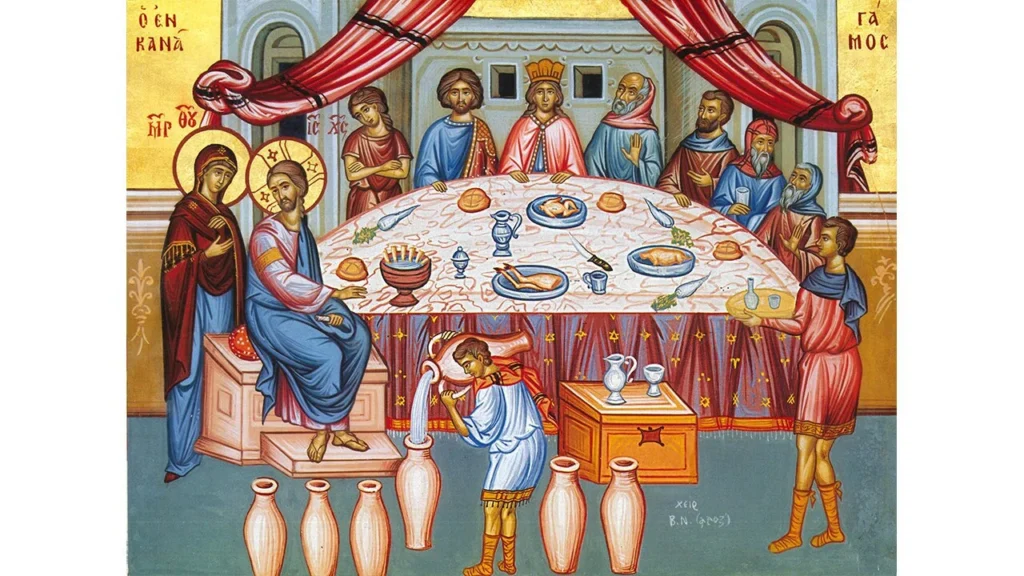In the name of the Father, and of the Son, and of the Holy Spirit, one God, Amen.
It is a natural part of our existence, dear brothers and sisters in Christ, to mark an event by sharing a meal together. Weddings, baptisms, Christmas, even funerals, are so often marked by sharing food together. We receive a guest into our homes and offer hospitality—perhaps a simple drink, perhaps a banquet—so that we may feel connected with one another. This is more than mere sustenance, more than assuaging hunger or thirst: this is about practising hospitality, about actualising our humanity, about being truly human.

“When Augustus reigned alone upon the earth,” (Doxasticon on ‘Lord I have Cried,’ Vespers of the Nativity) at the evening of this Age, God sent his Servant, his beloved Son, “to say to those who had been invited [to the Great Banquet] ‘Come; for all is now ready.’” And on hearing this invitation, I prevaricate and dither. “I have bought a field, and I go out and see it,” since I have become attached to this land, this existence, “I have bought five yoke of oxen, and I must go to examine them,” since my possessions mean more to me than dining with the Lord, “I have married a wife, and therefore I cannot come,” since I care more for the pleasures of this Age. The Lord freely offers to me Life, and I prefer to associate myself with death.
And so I must change, I must repent. I must “seek first the Kingdom of God and his righteousness,” (Matthew 6:33) and place my invitation to the Great Banquet first in my life. God shares freely no mere sustenance, no assuaging hunger and thirst according to the standards of this Age, God offers to me Life by offering to me union with him through his Son.
My dear brothers and sisters in Christ, let us, therefore, place God at the centre of our existence. God invites us to participate, even while living here in this Age, in this heavenly Banquet. God invites us to offer our weaknesses and receive in return strength, to offer our sufferings and dying and receive in return Life, to offer our mortal selves and receive immortality. And we cry out with the Psalmist,
Oh, taste and see that the Lord is good:
Psalm 33:9 ʟxx
Blessed is the man who hopes in him.
And yet. And yet, “there is still room.” Since God, “desires all men to be saved and to come to the knowledge of the truth,” (First Timothy 2:4) we must work to bring all the more to this heavenly Banquet, “that [his] house may be filled.” In this way, we may show ourselves worthy guests of the Banquet and feast, together with our brothers and sisters who are in need of salvation, on the heavenly Bread.
To our incarnate, crucified and risen God and Saviour Jesus Christ, who invites us to dine at the Great Banquet, be all glory, honour and worship, together with his unoriginate Father and the All-holy, Good and Life-giving Spirit. Amen.
Brethren, when Christ who is our life appears, then you also will appear with him in glory. Put to death therefore what is earthly in you: fornication, impurity, passion, evil desire, and covetousness, which is idolatry. On account of these the wrath of God is coming upon the sons of disobedience. In these you once walked, when you lived in them. But now put them all away: anger, wrath, malice, slander, and foul talk from your mouth. Do not lie to one another, seeing that you have put off the old nature with its practices and have put on the new nature, which is being renewed in knowledge after the image of its creator. Here there cannot be Greek and Jew, circumcised and uncircumcised, barbarian, Scythian, slave, free man, but Christ is all, and in all.
— Colossians 3:4–11
The Lord said this parable: “A man once gave a great banquet, and invited many; and at the time of the banquet he sent his servant to say to those who had been invited, ‘Come; for all is now ready.’ But they all alike began to make excuses. The first said to him, ‘I have bought a field, and I go out and see it; I pray you, have me excused.’ And another said, ‘I have bought five yoke of oxen, and I must go to examine them; I pray you, have me excused.’ And another said, ‘I have married a wife, and therefore I cannot come.’ So the servant came and reported this to his master. Then the householder in anger said to his servant, ‘Go out quickly to the streets and lanes of the city, and bring in the poor and maimed and blind and lame.’ And the servant said, ‘Sir, what you commanded has been done, and there is still room.’ And the master said to the servant, ‘Go out to the highways and hedges, and compel people to come in, that my house may be filled. For I tell you, none of those men who were invited shall taste my banquet. For many are called, but few are chosen.'”
— Luke 14:16–24
